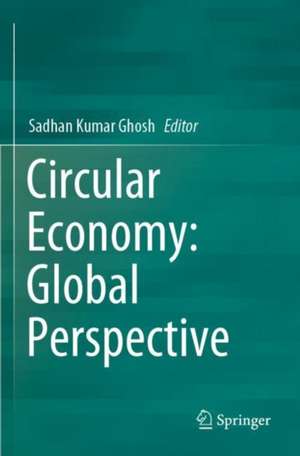Circular Economy: Global Perspective
Editat de Sadhan Kumar Ghoshen Limba Engleză Paperback – 13 noi 2020
| Toate formatele și edițiile | Preț | Express |
|---|---|---|
| Paperback (1) | 797.45 lei 38-44 zile | |
| Springer Nature Singapore – 13 noi 2020 | 797.45 lei 38-44 zile | |
| Hardback (1) | 812.76 lei 38-44 zile | |
| Springer Nature Singapore – 13 noi 2019 | 812.76 lei 38-44 zile |
Preț: 797.45 lei
Preț vechi: 1049.29 lei
-24% Nou
Puncte Express: 1196
Preț estimativ în valută:
152.64€ • 165.86$ • 128.30£
152.64€ • 165.86$ • 128.30£
Carte tipărită la comandă
Livrare economică 17-23 aprilie
Preluare comenzi: 021 569.72.76
Specificații
ISBN-13: 9789811510540
ISBN-10: 9811510547
Pagini: 452
Ilustrații: XIV, 452 p. 121 illus., 105 illus. in color.
Dimensiuni: 155 x 235 mm
Ediția:1st ed. 2020
Editura: Springer Nature Singapore
Colecția Springer
Locul publicării:Singapore, Singapore
ISBN-10: 9811510547
Pagini: 452
Ilustrații: XIV, 452 p. 121 illus., 105 illus. in color.
Dimensiuni: 155 x 235 mm
Ediția:1st ed. 2020
Editura: Springer Nature Singapore
Colecția Springer
Locul publicării:Singapore, Singapore
Cuprins
Introduction.- Circular Economy.- The Development of a Circular Economy in Australia.- Circular Economy in Bhutan.- Circular Economy in Canada.- Circular economy in China.- Global Status of Implementation of Circular Economy(GSICE) Germany.- Solid Waste Management in Lao PDR: A Pathway toward the CE.- Circular Economy for Sustainable Resource Management in India.- Circular Economy - Situation in Israel.- Circular Economy in Italy.- Circular Economy in Kenya.- Circular Economy in Malaysia.- An Overview of Circular Economy in Mauritius.- Circular Economy in Nigeria.- Circular Economy of Municipal Solid Waste (MSW) in S. Korea.- Circular Economy in Russian Federation.- Circular Economy for Sustainable Resource Management: The Case of Packaging Waste Sector in Thailand.- Developing the Circular Economy in the European Union.- Circular Economy in Vietnam.
Notă biografică
Dr. Sadhan Kumar Ghosh is the Dean of faculty of engineering and technology and Professor & Former Head of the Mechanical Engineering Department and Founder Coordinator of the Centre for QMS at Jadavpur University, India. A prominent figure in the fields of waste management, circular economy, SME sustainability, green manufacturing, green factories, and TQM, he served as the Director, CBWE, Ministry of Labour and Employment, Government of India, and L&T Ltd. Prof Ghosh is also the founder and Chairman of the IconSWM and President of the International Society of Waste Management, Air and Water, as well as the Chairman of the Indian Congress on Quality, Environment, Energy and Safety Management Systems (ICQESMS). He was awarded a Distinguished Visiting Fellowship by the Royal Academy of Engineering, UK, to work on “Energy Recovery from Municipal Solid Waste” in 2012. He received the Boston Pledge and NABC 2006 award for the most eco-friendly innovation “Conversion of plastics & jute waste to wealth” in the ESP/50K Business Plan Competition at Houston, Texas, USA. He holds patents on waste plastics processing technology and high-speed jute ribboning technology preventing water wastage and occupational hazards. He is member of ISO Working Groups concerning waste management (ISO/TC 297). His projects have been funded by European Union Horizon 2020 (2018-2022) on waste water, Royal Academy of Engineering (2018-2020 & 2012) on Circular economy in SMEs, Shota Rustaveli National Science Foundation (SRNSF) of Georgia (2019-2021) on resource circulation from landfill, GCRF 2019/2020 Pump Priming - Aston Project UK on impact of wellbeing & mental health on productivity & sustainability in Industries, UNCRD/DESA as Expert (2016-2018) on SWM, Asian Productivity Organisation (APO) (2016-2019) on green manufacturing, British Council & DST (2012-2014), Royal Society (2015), Erasmus Plus (2016-17), ISWMAW (2018-21), Indian Statistical Institute (2019-2021), Institute of Global Environmental Strategies (IGES, Japan) (2019), South Asian Cooperation Environmental Programme (SACEP, Sri Lanka)(2018-2020) for preparing SWM roadmap for South Asian Countries, Jute Technology Mission (2008-2011), Central Pollution Control Board (1999-2002), Govt. of India on plastics waste management and a few others.
Textul de pe ultima copertă
A circular economy is an alternative to a traditional linear economy (make, use, dispose) in which we keep resources in use for as long as possible, extract the maximum value from them whilst in use, then recover and regenerate products and materials at the end of each service life. Circular economy (CE) is important towards sustainable development, resources circulation and conservation, involving closing of material loops and cascading used resources, to prevent waste occurrence, and transforming the resulting residual streams into new (secondary) resources. Strategies and legislative framework for waste management are important steps for development of a more CE where resource efficiency becomes the key driver for both economic growth and environmental protections. A few countries achieved good results implementing CE as a replacement of the linear economy. Resource managers and planners should thoroughly identify factors to implement CE for societal benefits. This bookpresents how resource consumption is minimized with rational use based on 3Rs, legislative framework and government supports towards implementing CE initiatives, example of best practices, future plans and targets in different countries those are helpful for researchers, planners and implementers.
Caracteristici
Discusses circular economy from global perspective Presents chapters written by experts and active researchers Serves as a reference for researchers, planners and implementers
